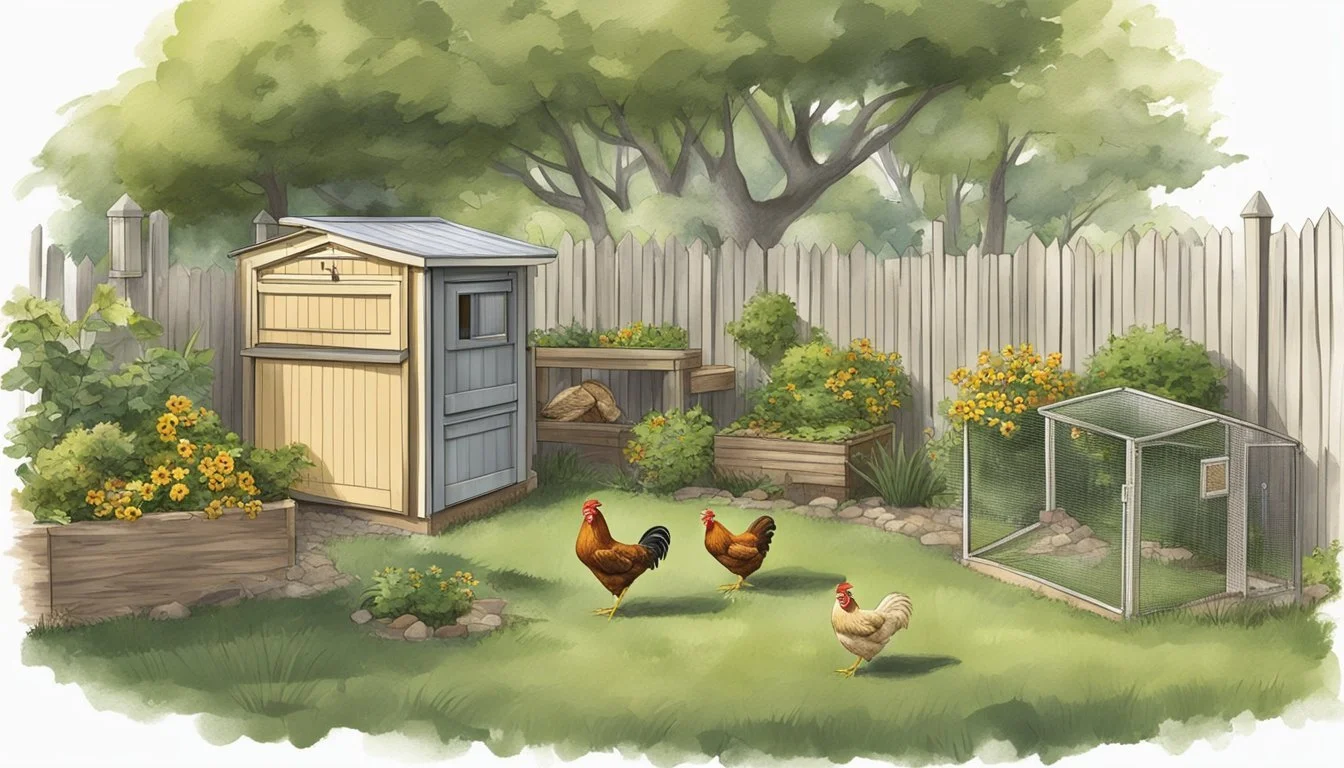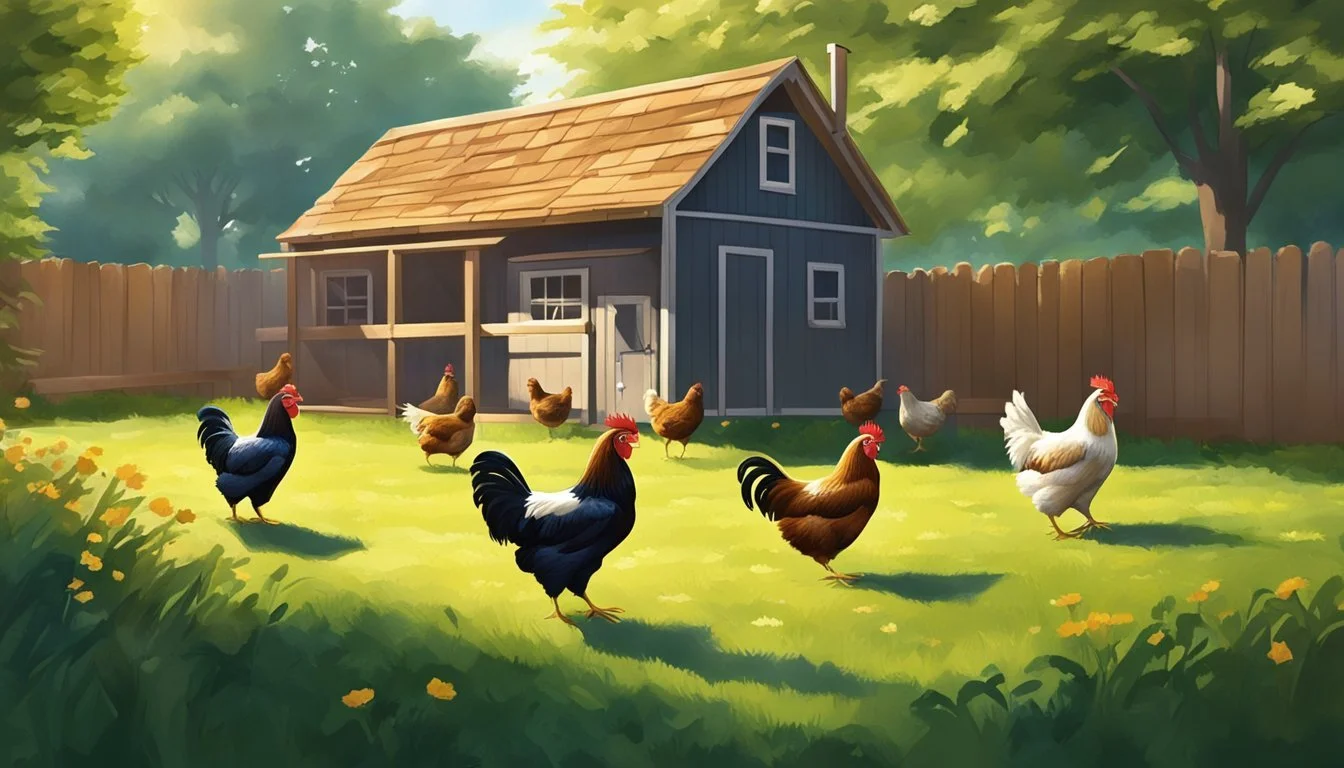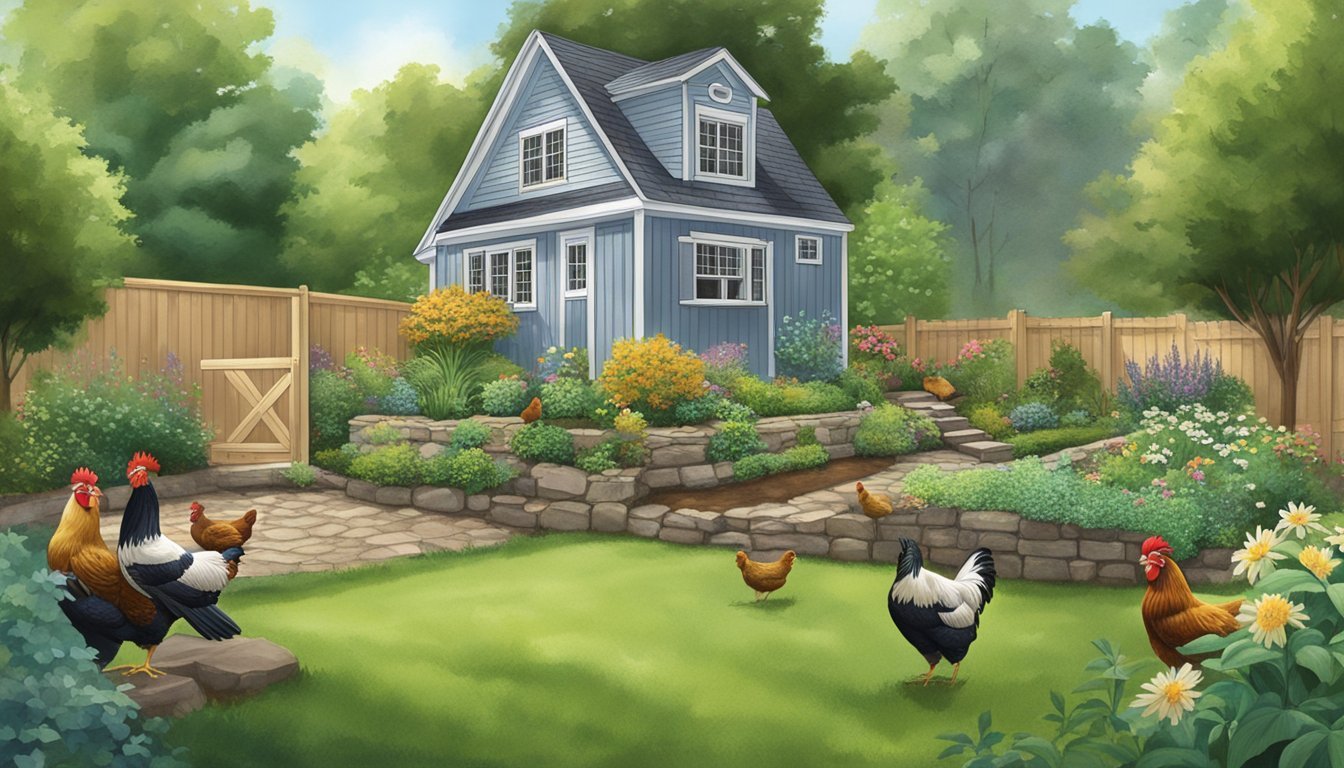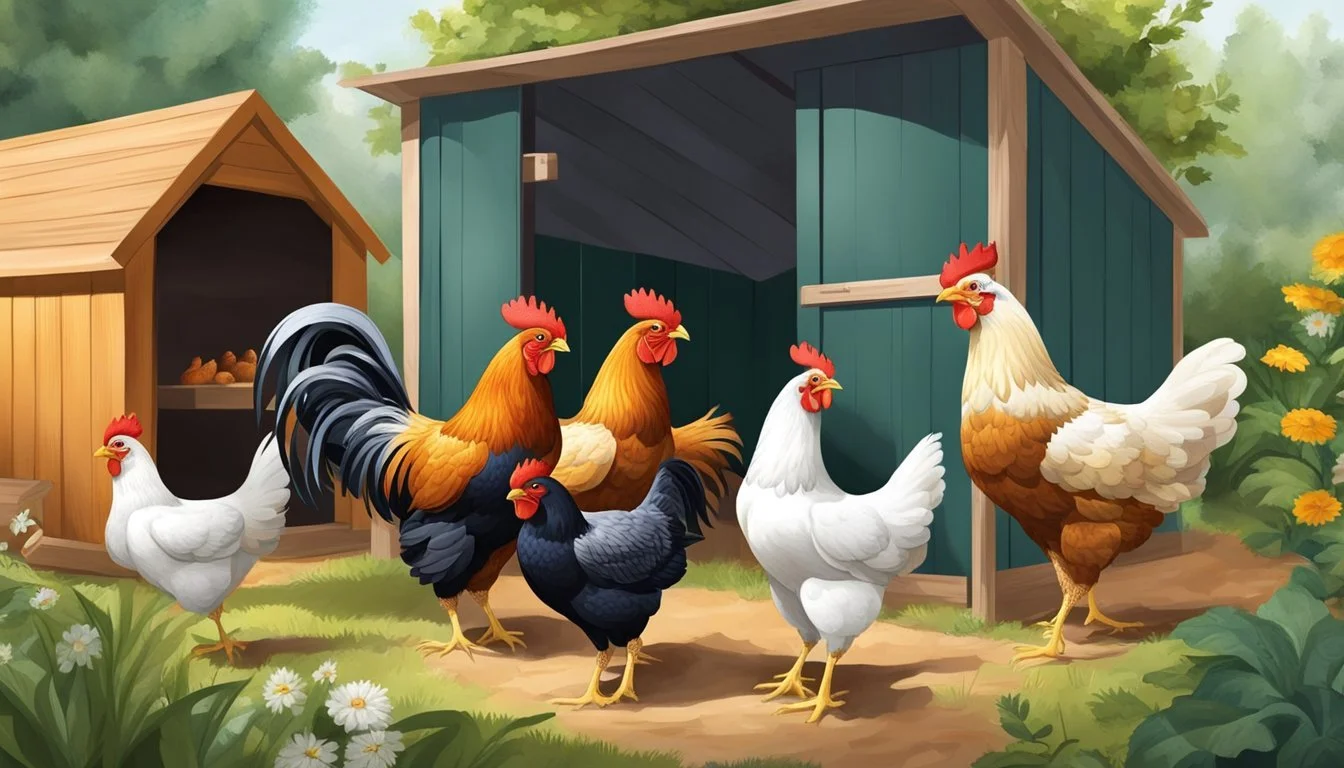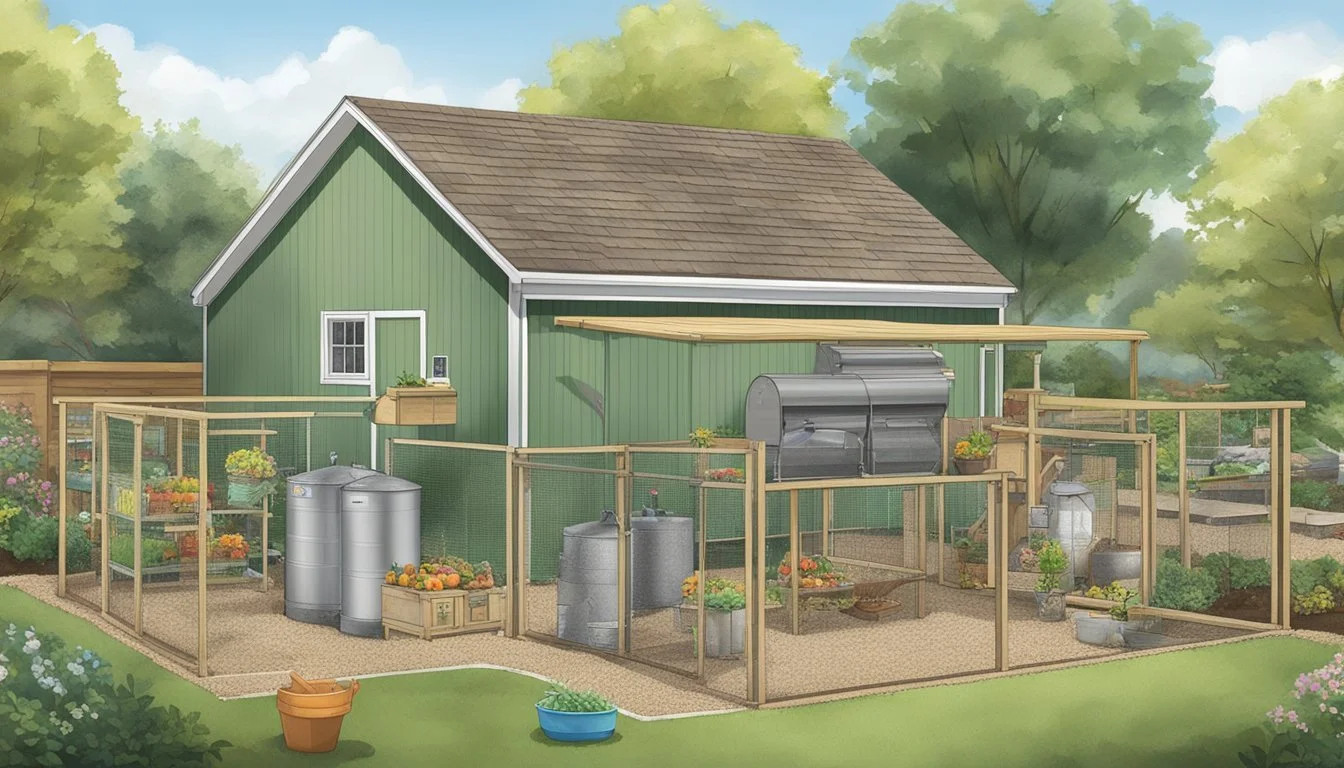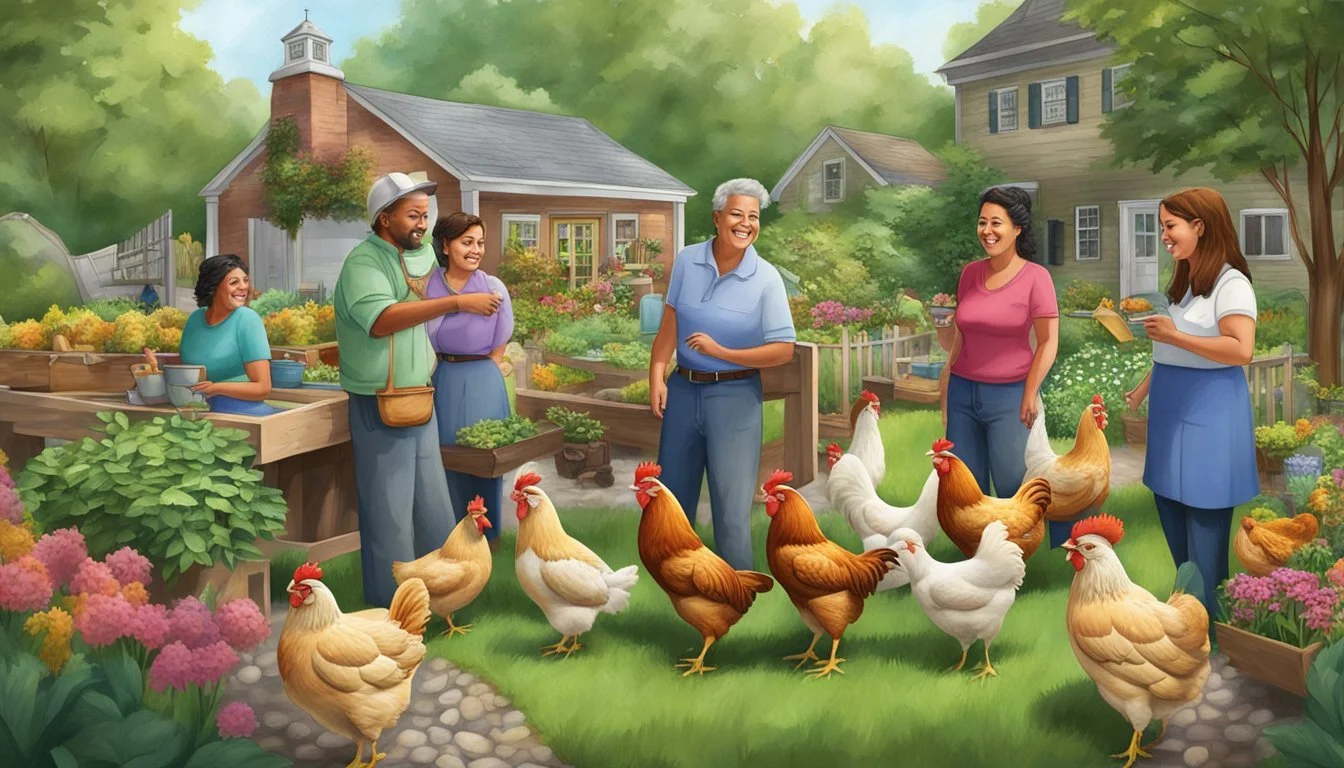Keeping Backyard Chickens in Woodbridge, NJ
Essential Tips for Urban Poultry Farming
Keeping backyard chickens has become increasingly popular in Woodbridge Township, New Jersey, as residents seek a more sustainable and self-sufficient lifestyle. This movement aligns with a growing interest in locally sourced food and the benefits of urban agriculture. In Woodbridge, the township's ordinances allow for the keeping of chickens, but it does come with certain requirements to ensure the harmony and safety of the community.
Residents interested in raising chickens must first obtain a permit which is subject to the township's discretion. The cost of the permit is nominal, but its approval will depend on an inspection to deem the land suitable for raising poultry. It is essential for prospective chicken owners to prepare for this inspection by understanding the local zoning laws which may vary by municipality, as well as any specific requirements Woodbridge has for the maintenance and location of chicken coops.
The drive towards self-sufficiency through raising backyard chickens comes with responsibilities. Woodbridge residents must familiarize themselves with the care of their poultry, the construction of secure and clean coops, and the management of feed and waste. All this is to ensure the well-being of the chickens and minimize any potential issues with neighbors or local wildlife. As such, it's not only about the pastoral appeal of keeping chickens but also adhering to regulations that maintain public health and neighborhood peace.
Understanding Local Chicken Laws in Woodbridge
Before one considers raising backyard chickens in Woodbridge, New Jersey, they should be aware that both state regulations and municipal ordinances will dictate the dos and don'ts of the practice. A permit is typically required, and local zoning laws must be adhered to.
New Jersey State Regulations
New Jersey state law provides a framework within which municipalities can draft specific ordinances regarding backyard chickens. It primarily concerns itself with health and safety standards that must be met, but it leaves room for cities to adapt their regulations based on local needs and conditions.
Woodbridge Municipal Ordinances
In Woodbridge, individuals must obtain a poultry permit from the municipality to keep chickens. The permit incurs a fee, and is subject to revocation by the township. The municipal code specifies that the township must assess the suitability of one's land for raising chickens, indicating an inspection might be required before approval.
Zoning Board Approvals
The local zoning laws play a significant role in determining whether one's property is eligible for keeping chickens. Residents should apply to the Woodbridge Zoning Board for the necessary approvals. The Board evaluates each application based on criteria such as property size, location, and the potential impact on neighboring properties.
Setting Up Your Chicken Coop
When setting up a chicken coop in Woodbridge, NJ, it's crucial to prioritize a suitable location, ensure the construction meets essential criteria, and incorporate safety features to protect from predators.
Choosing the Right Location
Selecting an ideal location for a chicken coop involves considering several factors. The coop should be placed a significant distance away from the property line to adhere to local regulations and maintain good neighbor relations. It's also vital to find a spot that has proper drainage to prevent water accumulation and to make sure the chickens are protected from harsh weather conditions. The site should offer enough space for the chickens to roam in their backyards and ensure adequate sunlight exposure while providing shade during the peak hours of the day.
Coop Construction Essentials
A robust chicken coop must provide shelter and comfort to the chickens while being functional for caretakers. Key construction essentials include:
Size: Ensure enough space for each chicken, typically 2-3 square feet inside the coop and 8-10 square feet in the run.
Ventilation: Proper ventilation is a must to remove moisture and ammonia, keep the air fresh, and prevent respiratory issues.
Materials: Use durable materials for longevity and weather resistance. Wood is a common choice, but it should be treated to prevent rot and pest infestation.
Insulation: Appropriate insulation keeps the chickens warm in winter and cool in summer.
Nesting Boxes: Provide one nesting box per every 3-4 hens, filled with straw or wood shavings.
Safety and Protection Features
Chickens are vulnerable to various predators; therefore, comprehensive safety measures are essential. Protection features must include:
Sturdy Latches: Equip doors and windows with secure latches, as some predators can manipulate simple closing mechanisms.
Fenced Run: Enclose the run with hardware cloth, not just chicken wire, to fend off smaller predators.
Predator Skirts: Burying hardware cloth around the perimeter can deter digging animals.
Roofing: Provide the run with a solid or wire roof to protect against aerial threats.
Choosing Your Chickens
When venturing into the world of backyard chickens in Woodbridge, NJ, one must consider the breed's adaptability to the local climate and the purpose of raising them, whether for eggs, meat, or as pets.
Selecting Chicken Breeds
When selecting breeds, potential owners should examine the climate compatibility, purpose, and temperament of the chickens. For instance, breeds like the Plymouth Rock and the Rhode Island Red are hardy to various climates and are excellent layers, making them ideal for beginners. Those looking for pets might prefer the Silkie or Bantam breeds, known for their docile nature. It’s essential to remember that local regulations may limit the types of chickens allowed, therefore checking with the relevant Woodbridge Township authorities before acquisition is advisable.
Cold-Hardy Breeds: Ideal for New Jersey's variable climate.
Plymouth Rock
Rhode Island Red
Pet-Friendly Breeds: Known for their docility.
Silkie
Bantam
Understanding Roosters vs. Hens
Distinguishing between roosters and hens is crucial for backyard chicken keepers. Roosters are male chickens noted for their crowing and protective behavior towards the flock. Hens are female chickens that lay eggs and are generally quieter. Woodbridge Township regulations might restrict or prohibit rooster ownership due to noise concerns, hence verifying this information is critical.
Roosters:
Crowing can cause noise issues.
May be regulated or not permitted.
Hens:
Lay eggs.
Typically quieter and preferred for backyard settings.
Daily Management and Care
Effective daily management and care are critical for the health and well-being of backyard chickens in Woodbridge, NJ. Adherence to a consistent routine ensures a sanitary environment, which is essential to prevent the spread of diseases and to maintain a healthy flock.
Feeding Your Chickens
Chickens require a balanced diet consisting of layers' pellets, grains, and occasional treats. It's important to offer feed twice a day to ensure chickens get the necessary nutrients. Feeding schedules should be consistent, with mealworms serving as an excellent protein-rich snack. Be mindful to store feed in airtight containers to prevent mold and deter pests.
Morning Feed: Offer a portion of complete feed; ensure it's fresh.
Evening Treats: Supplement with mealworms or kitchen scraps before dusk.
Watering and Hydration
Chickens must always have access to clean, fresh water. Waterers need daily refilling to prevent the growth of algae and bacteria, especially in warm weather. In winter, it's crucial to ensure the water doesn't freeze. Use a water dispenser large enough for the flock and clean it regularly.
Water Dispenser Tips:
Check water levels twice a day, morning and evening.
Clean dispensers weekly to maintain water hygiene.
Coop Cleaning and Maintenance
A clean coop is vital to keep chickens healthy and minimize odors. Perform daily spot checks to remove waste and wet bedding. A deep clean, which involves removing all bedding and scrubbing the coop, should be done every few weeks to eradicate bacteria and parasites.
Daily: Spot clean to remove droppings and soiled bedding.
Weekly: Rake out old bedding, replace with fresh material.
Monthly: Deep clean the coop; disinfect feeders and waterers.
Handling Eggs
When keeping backyard chickens in Woodbridge, NJ, managing egg production involves proper collection and storage practices, as well as an understanding of the chickens' laying patterns.
Collecting and Storing Fresh Eggs
One must collect fresh eggs from their backyard chickens daily to ensure cleanliness and to prevent the eggs from being soiled or damaged. Upon collection, it's vital to:
Inspect each egg for cracks or dirt.
Wipe off any debris with a dry cloth; avoid washing as it can remove the protective bloom.
Store eggs in a refrigerator at 40°F or below.
For best quality, one can use a storage system that marks the date of collection:
Date Collected Number of Eggs February 20 4 February 21 5 February 22 3
This table can help keep track of freshness, as eggs generally remain edible for about 3 to 5 weeks when refrigerated.
Understanding Egg Laying Patterns
Backyard chickens in suburban settings like Woodbridge have laying patterns influenced by factors such as daylight, breed, and age. They typically lay one egg every 24 to 26 hours, but this can vary. As the days get longer in spring, egg production tends to increase.
Key points to remember about laying patterns:
Daylight: More daylight stimulates egg-laying; supplementary light in the coop can help maintain production in winter.
Breed: Some breeds lay more eggs than others; research breeds to understand their specific laying rates.
Age: Chickens' laying rates peak in their first year and decrease gradually thereafter.
By monitoring these patterns, owners can better anticipate the number of fresh eggs their backyard chickens will produce and manage their expectations and egg storage needs accordingly.
Health and Welfare
When raising backyard chickens in Woodbridge, NJ, maintaining their health and welfare is paramount. It involves two critical aspects: providing them with adequate shelter and managing their health effectively.
Providing Adequate Shelter
Shelter is essential for the protection and well-being of backyard chickens. Owners must ensure that the coop is:
Sanitary: Cleaned regularly to prevent disease.
Secure: Protected from predators.
Ventilated: Proper airflow to avoid respiratory issues.
Appropriate size: At least 3 square feet per chicken.
A proper habitat also includes an outdoor space where chickens can forage, dust bathe, and exhibit natural behaviors.
Managing Chicken Health
Effective management and care include:
Regular health checks for signs of illness or injury.
Maintaining a sanitary environment to mitigate disease spread.
Providing nutritious food and clean water.
Vaccinations and treatments as necessary.
Diligent care is essential in detecting issues early and ensuring the longevity and productivity of the chickens.
Community and Legal Considerations
When raising backyard chickens in Woodbridge, NJ, residents must navigate both community etiquette and local laws. These considerations ensure proper management and legal compliance, impacting one’s ability to keep poultry harmoniously within the township.
Dealing With Noise and Neighbors
Residents must manage noise levels to maintain good relationships with their neighbors. Chickens can be noisy, particularly roosters, which are often more regulated. It is advisable to consult Woodbridge Township’s noise ordinances and discuss plans with neighbors to mitigate any concerns about disturbances.
Legal Implications of Selling Eggs or Meat
Selling eggs or meat from backyard chickens involves adhering to local health regulations and obtaining necessary permits. The sale of eggs and meat is regulated to ensure public health safety, and individuals must comply with both Woodbridge Township requirements and New Jersey state laws. This might include permits for selling at a market or for commercial purposes, and ensuring that products meet safety standards if shown or sold to the public.
Seasonal Concerns and Adaptations
In Woodbridge, NJ, backyard chicken keepers must make adaptations for their flocks due to the climate changes experienced in winter and summer. Careful planning ensures the health and productivity of chickens year-round.
Preparing for Winter
During winter in New Jersey, temperatures can drop significantly, meaning that chicken coops require sufficient insulation to keep birds warm. It's essential to balance insulation with ventilation to prevent moisture buildup, which can lead to respiratory issues in poultry. Here are key actions to take:
Insulation: Use materials like straw or foam to insulate walls without compromising airflow.
Water: Prevent water from freezing by using heated water dispensers.
Feeding: Increase caloric intake by providing feed rich in carbohydrates and fats.
Moreover, ensuring that there is no draft in the sleeping areas helps maintain the chickens' body heat. It's important not to overheat the coop, as chickens are well-equipped to handle the cold, provided they stay dry and out of the wind.
Summer Heat Management
New Jersey summers present the opposite challenge, with rising temperatures that can stress chickens and reduce egg production. To avoid overheating:
Shade: Ensure there is adequate shade in the chicken run to protect birds from direct sunlight.
Water Supply: Provide a constant supply of fresh, cool water to prevent dehydration.
Ventilation: Enhance coop airflow with additional windows or a fan to facilitate cooling.
Light colored covers may be used to reflect sunlight away from the coop, and adding frozen treats such as watermelon can help chickens cool down. Chickens can also benefit from a shallow pool of water in which they can wade to regulate their body temperature.
Advocacy and Further Resources
For residents of Woodbridge, NJ, and nearby areas, engaging with local advocacy groups and participating in educational events are pivotal steps in ensuring responsible and legal backyard chicken keeping.
Joining Local Poultry Groups
Community involvement is key when navigating the intricacies of legal poultry keeping. In New Jersey, several municipalities, including Camden, Elizabeth, Jersey City, and Trenton, have local groups that advocate for the rights of backyard chicken owners. These groups often communicate and organize through social media platforms such as Facebook. For example, a group like Camden County Chickens serves as a hub for locals to share experiences, information on local chicken laws, and best practices for managing backyard flocks.
Residents of Woodbridge may reach out to similar groups in neighboring areas like Cherry Hill, Newark, Paterson, Gloucester, New Brunswick, and Monroe Township to gain insights and support. It's beneficial for those in the community to form connections with these groups to stay informed and engaged with the broader Garden State's chicken keeping community.
Educational Workshops and Seminars
Educational workshops and seminars play an invaluable role in equipping potential and current chicken owners with the knowledge required to effectively manage their flocks. These events, often hosted by entities such as the Rutgers Cooperative Extension, provide practical advice that ranges from building suitable shelters to understanding nutritional needs. Workshops may also address legal regulations, offering clarity and guidance on local ordinances that govern backyard chicken keeping.
Many New Jersey towns offer workshops designed to empower residents to become self-sufficient through raising their own poultry. These educational opportunities ensure that enthusiasts are well-versed in the nuances of animal husbandry and local compliance, thereby fostering a more sustainable and informed community of backyard farmers.
Getting Started With Backyard Chickens
When individuals in Woodbridge, NJ consider raising backyard chickens, they should begin by acquiring the appropriate township poultry permit, which is a revocable $10 document, ensuring they comply with local ordinances. It is crucial to have the township inspect the land for suitability to raise chickens.
Preparing the Coop: Before bringing chicks home, a sturdy coop is essential. The coop should protect the chickens from weather and predators, and it should also have a perch for roosting and a nest box for each laying hen.
Selecting Chickens: Choose breeds that are known for their companionship, hardiness, and egg production appropriate for New Jersey's climate. It's important to note that roosters may not be allowed in some municipalities due to noise ordinances, and the number of chickens permitted can vary.
Care and Maintenance:
Feeding: Provide a balanced diet of chicken feed, supplemented with kitchen scraps and possibly insects if they are allowed to forage.
Health: Regularly check for signs of illness or distress and maintain a clean, sanitary coop environment.
Community: Chickens are social creatures and benefit from living in groups for companionship.
Local Regulations: Each potential chicken keeper should be aware of specific local regulations, such as minimum distances from neighboring properties and the maximum number of chickens allowed.
Education: For newcomers to chicken keeping, local online and hands-on classes are recommended for a better understanding of care, feeding, and husbandry practices.
By following these guidelines and continuing to educate oneself on the specifics of chicken care, residents of Woodbridge can enjoy the rewards of fresh eggs and the companionship provided by these feathered friends.
Local Suppliers and Support
In Woodbridge, NJ, residents have access to both local suppliers for starting and maintaining their backyard chicken flocks, as well as veterinary services to ensure the health and well-being of their poultry.
Purchasing Chickens and Supplies
Local suppliers in Woodbridge offer a variety of chickens and essential supplies needed to raise a backyard flock. Potential keepers can find starter kits that include feeders, waterers, and bedding. The most common point of sale for live chickens, feed, and coop materials would be at local feed stores or through regional farm networks. Stores such as 'Woodbridge Feed & Supplies Co.' often provide a range of chicken breeds suitable for different purposes, whether for egg laying or as pets.
Chickens: Various breeds available, including layers and ornamentals.
Coops: From prefabricated to custom designs.
Feed: Layer pellets, scratch grains, and supplements.
Accessories: Nesting boxes, perches, and fencing.
Accessing Veterinary Care
Veterinary care is crucial for the health and longevity of backyard chickens. Woodbridge is served by veterinarians skilled in avian medicine, although they might not be as prevalent as those for cats and dogs. Clinics like 'Woodbridge Avian & Exotic Veterinary Care' specialize in poultry and can offer both routine and emergency care services. Preventive care such as vaccinations, parasite control, and regular health checkups are offered to local residents.
Preventive Services: Vaccinations, deworming, mite and lice treatment.
Diagnostic Services: Fecal exams, blood work, and x-rays.
Treatment: Medical and surgical interventions for common chicken ailments.
Engaging With the Chicken Owner Community
For chicken owners in Woodbridge, NJ, a strong sense of community can greatly enhance the experience of raising backyard chickens. Involvement in local groups and online platforms can provide valuable support and insight into best practices for chicken ownership, fostering both companionship and a collaborative spirit.
Online Forums and Social Media
Chicken enthusiasts often turn to online forums and social media for advice, sharing experiences, and making connections with like-minded individuals. Facebook groups dedicated to backyard chickens are a popular hub for Woodbridge residents to discuss various aspects of chicken care, from nutrition to coop design. These platforms allow for real-time interaction and offer a wealth of collective knowledge beneficial for both novice and seasoned chicken owners.
Popular Online Resources:
Backyard Chickens Forum
Poultry-related Facebook groups
Woodbridge Chicken Keeping Groups
In person, Woodbridge has community groups that hold gatherings, such as workshops where chicken owners can meet and learn from each other. Attendance at these events has been reported to grow year over year, indicating a thriving interest in chicken keeping within the township. These groups are not only a source of camaraderie but also act as a platform where members can support each other in matters related to obtaining permits and preparing suitable land for their flocks.
Local Community Activities:
Chicken owners workshops
Coop tours and land suitability discussions


